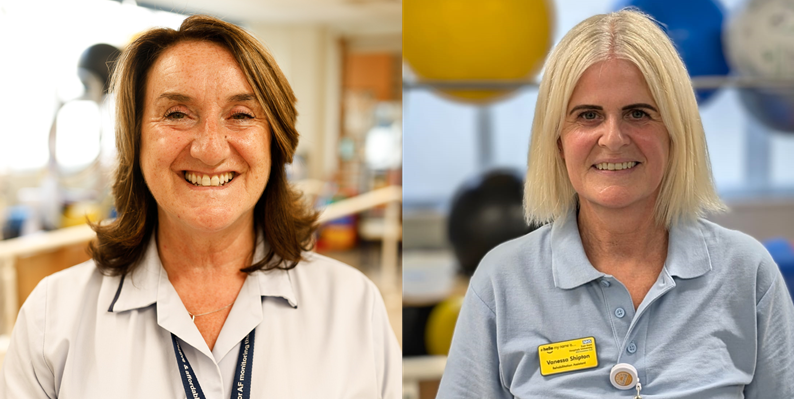
Vanessa and Karen provide vital support for stroke survivors
A service helping stroke survivors recover faster at home has seen waiting times slashed from six weeks to eight days.
East Kent Hospitals’ stroke bridging service provides a link between hospital care and home, with specialist staff visiting people after they have been discharged.
The team – rehab technicians Karen Bolton and Vanessa Shipton - are able to ensure any specialist equipment is in place and develop exercise programmes to help patients recover their mobility, as well as completing any referrals for additional care or support.
Andrea Miles, whose husband Andrew, 65, suffered a stroke in July, said the team’s visits to their home in Faversham were hugely valuable.
She said: “The swift response from Karen made all the difference.
“She made everything clear and started Andrew on some exercises which have really helped with his strength and confidence.
“He was desperate to go home but he couldn’t really walk or manage the stairs and Karen was able to help make sure he could get around safely.”
Lizzie Burgess, whose husband Wayne also suffered a stroke, said they were very grateful for the team’s input.
She said: “Vanessa really listened, and I think she was the first person to ask if we were okay and what we needed.
“She helped with his physical recovery and was able to do lots of referrals as well, and help us with things like applying for a blue badge for parking, and to understand what benefits we might be entitled to.
“She has been amazing, and is always on hand with advice. It is very daunting when you first come home, and it feels like you don’t know if you are coming or going, so it was so helpful to have Vanessa to help.”
Research shows that the first three months after a stroke are key for people’s recovery, so the sooner someone can start working on their rehabilitation, the better.
Karen said: “The service was set up in collaboration with Kent Community Health, and we have been able to take a lot of the less complex patients off their lists, leaving them for their qualified therapists.
“This means we can see people quickly, provide the equipment or information they need and then discharge them, leaving the community Trust free to concentrate on the more complex patients.
“So far we have seen almost 1,000 people, and we do see a real difference in people from when they first go home and they may be feeling quite anxious, to when we are able to discharge them and they are much more confident about managing at home and their recovery.”
Karen and Vanessa, who are based at the Kent and Canterbury Hospital, offer several visits to check on people’s progress and provide reassurance, and can also refer to voluntary organisations who can provide further support.
Karen said: “We have the luxury of being able to be flexible and responsive so we can tailor the service to people’s needs, and it is always evolving.
“We have back-up from the teams at the hospital such as physiotherapists, occupational therapists, speech and language therapists and ward staff who are always available to give advice.”